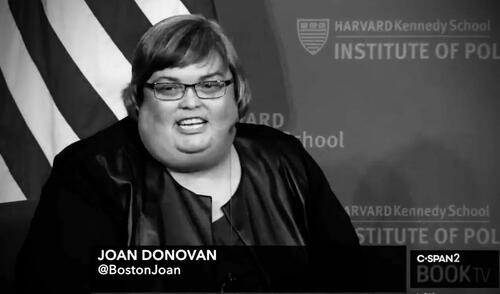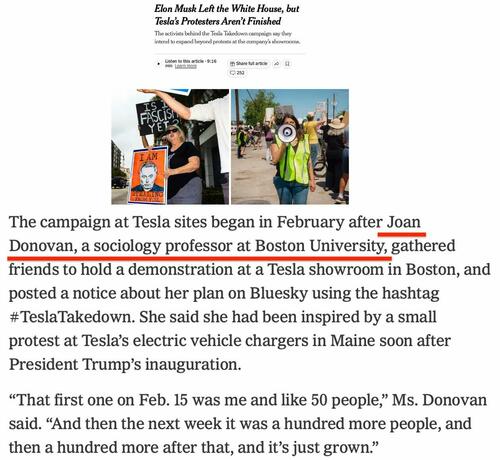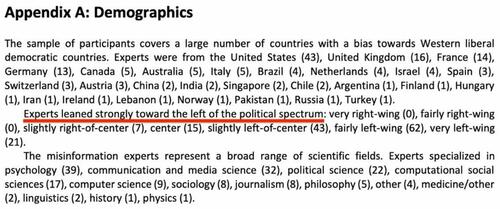Authored by Paul D. Thacker via The DisInformation Chronicle,
A funny thing happened when the NY Times reported a month back that Elon Musk’s exit from DC politics had been facilitated by a group of activists targeting his electric car company after he abandoned Democrats, helped fund Trump’s election, and then ran DOGE.
In short, Musk supports zero Democratic Party politicians and none of their priorities.
Enter Democratic activists who protested against the company run by the party’s main boogey man—protests that sometimes veered into violence and started at the impetus of sociology professor Joan Donovan. Here’s the Times report:
The problem with Times story is what the Times journalist doesn’t tell us, namely the function professor Joan Donovan has served at the New York Times and other legacy news. Labeling Donovan a “sociology professor at Boston University,” skips over this purported academic’s role as a central character in the Time’s fake narrative that America is awash in “disinformation” that can only be fixed by legacy media and professors, like Joan Donovan—a misinformation authority who allegedly publishes objective scholarship with neutral, verified facts and reliable truths.
“Dr. Donovan leads the field in examining internet and technology studies, online extremism, media manipulation, and disinformation campaigns,” explains one news site. “She conducts research, develops methods, and facilitates workshops for journalists, policy makers, technologists, and civil society organizations on how to detect, document, and debunk media manipulation campaigns.”
In reality, the entire arena of disinformation studies has been exposed as a jobs program for liberal activists who dress up in academic garb, to provide quotes to the Times when they run articles claiming anything not published in the New York Times might be disinformation.
Here’s just a few examples:
Donovan was in hot demand throughout 2020 as a quotable expert to anchor New York Times stories on alleged rampant disinformation (spread only by conservatives and Trump supporters, of course):
However, professor Donovan’s sparkly “scholarly” judgements tend to dull and tarnish under history’s harsh light, a common occurrence among her fellow “disinformation experts.”
Right before the 2020 election, the New York Post broke a story based on documents and emails found on the laptop of Hunter Biden that implied he might be getting rich off his father’s name and that the President was aware of this. “Well we know that this whole smear on Joe Biden comes from the Kremlin …” Congressman Adam Schiff alleged on CNN, defending Biden weeks before the election. “Clearly, the origins of this whole smear are from the Kremlin, and the president [Trump] is only too happy to have Kremlin help and try to amplify it.”
Frightened by the “RUSSIAN DISINFORMATION!!!” outcry, social media companies began censoring the Hunter Biden laptop story. But when social media companies ceased censoring the New York Post’s election bombshell scoop, the NY Times quoted Donovan claiming the censorship that began becuase of politics had ceased because of—get this—politics.
“They are merely reacting to public pressure and therefore will be susceptible to politician influence for some time to come,” Donovan told the Times.
At this point, much of the information on Hunter Biden’s laptop has now been validated. And after first claiming the emails and photos from his laptop were not real, Hunter Biden sued a Republican operative for published these very same emails and photos from Hunter Biden’s laptop on a website called Marco Polo. After his father gave him a blanket pardon from prosecution, Hunter withdrew his lawsuit and the founders of Marco Polo sued him for attorney’s fees.
I could document other examples of Donovan’s academic musings running uncontrollably like a Southern California wildfire throughout the media before falling apart upon closer inspection, but what’s the point? Her fellow “disinformation academics” have a similar spotty history, including Renee DiResta (the disinformation “hobbyist” bounced from Stanford, now at Georgetown, who seems to have lied about her own history of spreading election disinformation); and Brown University’s Claire Wardle (who once claimed COVID vaccine mandates were a “conspiracy” and then pivoted to defend those same COVID vaccine mandates once President Biden implemented them).
None of these academics retain their former credibility. Last summer, the Chronicle of Higher Education eviscerated Joan Donovan in an investigation that ran almost 11,000 words, with several of her former Harvard colleagues correcting her fibs and mischaracterizations, calling out poor research habits, and noting a chronic pattern of making unhinged accusations that lack evidence.
“How I see Joan more than anything is an opportunist who will stop at nothing to put herself in an optimal position,” one of her former Harvard colleagues told the Chronicle. “Anyone who’s seen as a threat to that is somebody to be targeted, displaced, and she doesn’t care who those people are.”
In response to the Chronicle’s questions, Donovan invented wild claims that shadowy forces were out to get her … including the reporter. “There are people who do want me dead,” Donovan wrote to the Chronicle, in one example, among a slew of texts.
Nonetheless, it remains critical to remember the role Donovan, DiResta, Wardle and other “disinformation experts” played in lying to the public that they held some special scholarly claim on truth while they helped censor perceived political opponents during a pandemic that was the most tumultuous period in a generation. The real truth is that none of these self-ordained wizards had any exclusive understanding of falsehoods, lies or medical evidence. Like priests in the past, censorship scholars pretend to possess a unique insight to truth, a lie we can now all see quite clearly.
AFTERTHOUGHT
Harvard University runs a journal called the Harvard Kennedy School Misinformation Review which publishes prestigious homilies written by the censorship clergy. In July 2023, the HKS Misinformation Review released a survey of “150 academic experts on misinformation” examining their views on the censorship field and its future. As is often the case in academic studies, the best findings can be found buried in the appendix.
In appendix A we learn that “academic experts on misinformation” skew in one political direction. Guess which direction! Just take a gamble.
None of the “experts” in this field are right-wing or conservative. But around 80% consider themselves Lefties. Does such a field sound like it attracts and fosters dispassionate scholars, or ideologically-aligned political priests?
The HKS Misinformation Review’s mission statement says it’s a peer-reviewed, scholarly publication that publishes high-quality research that examines misinformation from “different perspectives.”
Now close your eyes and imagine—just for a microsecond!—that this field skewed 80% conservative. Do you think the New York Times and legacy media would rely on professors from this field like Donovan, DiResta, and Wardle to tell you the “truth” on pretty much any topic that appears in a newspaper—elections, public health, foreign policy—if all three of these women professed views that aligned with a right-wing politician like Congresswoman Marjorie Taylor Greene?
If 80% of “disinformation academics” were conservative, do you fee confident Harvard would publish and promote their esteemed journal?
Loading recommendations…





















